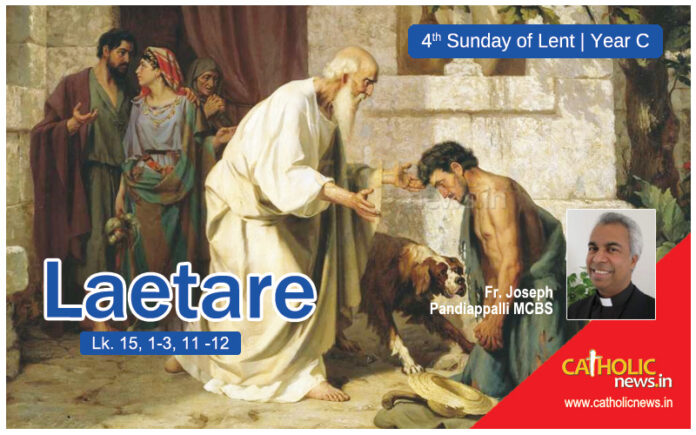
The fourth Sunday of lent is called Laetare. The Latin word Laetare means „rejoice“. We read in the book of Isiah 66,10; Rejoice with Jerusalem, and be glad for her, all you who love her; rejoice with her in joy, all you who mourn over her.“ The reason for the joy is the work of salvation of God. In the first three weeks of the lent the subject of the reading in the liturgy was sin, guilt and repentance. On the fourth Sunday the theme is God’s dealing with his people. Since the theme of the fourth Sunday is joy, the fourth Sunday of lent is also called as a mini Easter. Therefore the colour of the liturgical vestments on the fourth Sunday is rose. Since God is with us and God helps us in spite of our weakness and failures the lent season has a joyful sense.
We just heard three parables, like three interesting stories, from Luke 15. The themes and messages of these parables are so significant. Therefore Luke 15 is called the gospel within the gospel. These three parables illustrate the deep and inseparable relationship between God and humanity. In this relationship each individual person is as important as hundreds of peoples and groups. These three parables also show that the weak and the sinners are as important to God as hundreds of strong, intelligent, and successful people.
At one point, Jesus speaks about a single lost sheep that the shepherd is searching for in the desert. Jesus shows that for the shepherd, this one lost sheep is as important as 99 sheep that always remain with the flock. The joy of finding the lost sheep expresses God’s joy with us when we think of him.
Then Jesus talks about a drachma, a small unit of currency, perhaps like a cent or paise, that a woman had lost. To find this lost coin she took a lot of effort, but it seemed important to this woman to find it. Many of us probably wouldn’t have put in so much effort and spent so much time trying to find a cent or a paise. We probably wouldn’t have even noticed that a cent or a paise was missing from our wallet. A cent or five cents, I think even 20 cents, is insignificant to many of us today. Through this parable, Jesus shows us that even a cent or paise is important and that we shouldn’t lose even this small piece of value without paying attention.
It’s the same with the prodigal son. We’ll probably think, like the jealous older brother, that someone who received his share and later lost everything shouldn’t return home to his father. If he does come, the father shouldn’t let him back into the house. It’s true that the younger son lived without discipline and, as a result, was unsuccessful in life. It’s also true that he lost much of the family’s money and fortune through his disorderly life, and that he greatly damaged the honor and name of his father and the family. But his behavior and the reasons for it are no longer important to his father. He is happy about his return and has a celebration prepared.
In the first parable about the lost sheep the animals are the focus. The second parable is about money, property and possessions and the third parable is about human. Whether we are talking about animals and plants or about money, property and possessions or about people, each and every individual has a place in God’s plan of creation and even the smallest things should be viewed with respect and appreciation. When we talk about the importance of people before God, we should also be aware that every single person, whether young or old, sick or healthy, successful or unsuccessful, sinful or blameless, has the right to come before God; each and every one of them is welcome and valuable to him. God wants to take everyone in his arms. God is very happy when we come to him and seek his closeness.
Fr Joseph Pandiappallil MCBS



